Movie Review: The Taebaek Mountains
by refresh_daemon
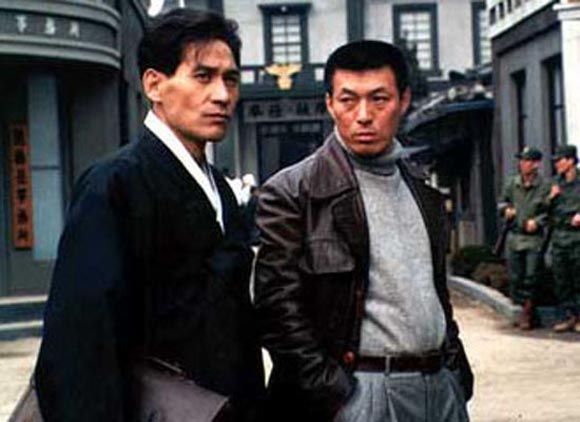
Although North and South Korea eventually ended up divided mostly along ideological lines, after Korea was freed from Japanese control at the end of the Second World War, leftists and rightists understandably existed in cities all over the peninsula and the political spectrum even among them varied. As the tension between communist and capitalist ideologies mounted in the lead up to the Cold War, the newly freed Korea found itself divided with the Soviet backed North declaring a Communist government under Kim Il-sung and the American-backed South declaring a rightist government.
As denizens of both the North and the South found themselves in governments that were formed without their consensus and opposed to their own ideologies, violence, executions, and paranoia unsurprisingly erupted. In the South, the first organized rebellion happened on Jeju Island, depicted in the Korean independent film Jiseul, and the newly installed government of President-Dictator Syngman Rhee brutally clamped down on it.
This had the effect of spurring the Communist sympathizing residents of Southern Jeolla Province (Jeollanam-do), particularly in the cities of Yeonsu and Suncheon, into their own organized rebellion. That moment of organized rebellion is the context of director Im Kwon-taek’s The Taebaek Mountains (1994).
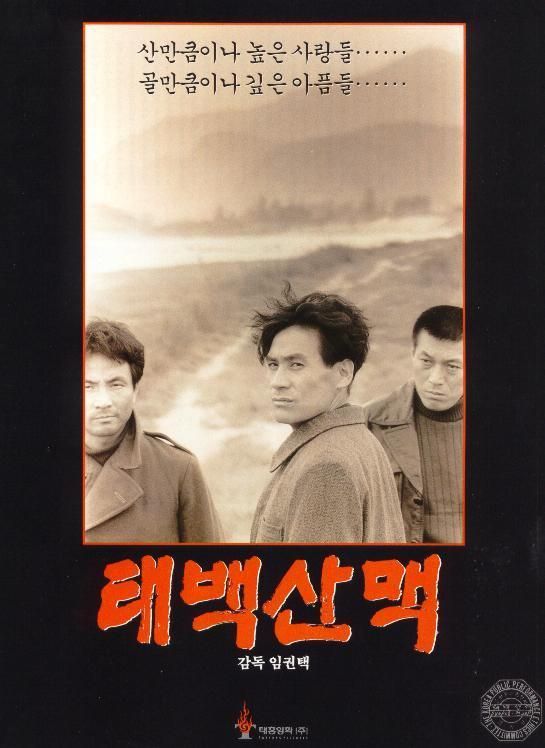
Adapted from a lengthy set of novels, the setting of The Taebaek Mountains is a little Jeollanam-do town called Beolgyo, which is adjacent to Yeonsu and Suncheon. Beolgyo specifically has a history of being particularly controlled by the Japanese during the annexation with the Japanese making certain sympathetic Koreans wealthy by redistributing land to their favor. The tension in the town in the aftermath of the Second World War results from the now wealthy landowners supporting the new rightist government while the impoverished and oppressed tenants of those farms are drawn to the Communist message of equal distribution.
As the Communist rebellion overtakes Yeonsu and Suncheon, one branch of its forces, led by Beolgyo native Yeom Sang-jin (Kim Myung-gon) marches into Beolgyo and takes it over, the town having been abandoned by its police force. The Communists quickly execute a number of rightists still in the town before the local law enforcement, now bolstered by the new Republic of Korea military, chase the Communists out to nearby Mount Jogae.
Even having recaptured the town from the Communists, tensions mount in the city as the local government clashes with the overzealous witch-hunt of the military, landlords deal with tenants who are clamoring for lands of their own, locals use the conflict to target their rivals, and law enforcement is dragged into the hunt for Communists, led by Chief Inspector Yeom Sang-gu (Kim Gab-soo), brother of Yeom Sang-jin.
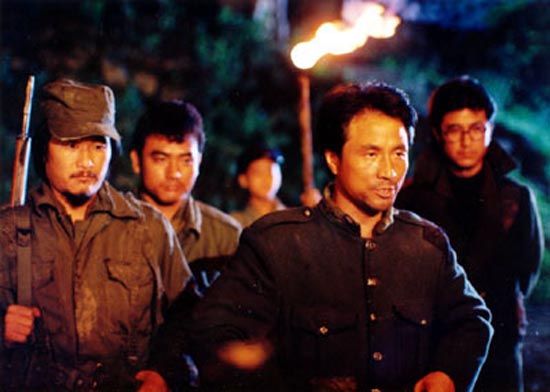
Meanwhile, moderate nationalist and respected teacher Kim Beom-u (Ahn Sung-ki) tries to limit the damage that both sides inflict and argues for reasonable reforms that will placate the tenants while Yeom Sang-jin and his troops regroup in the mountains, hoping for help from their comrades in the North.
The film covers a number of years, from emancipation from the Japanese into the early moments of the actual Korean War, and while it fortuitously chooses to stick to the settings of Beolgyo and the mountain where the Communist forces hide out, it still runs quite long at over two an a half hours.
The film is also packed with so many characters that many of them simply do not get the development needed to really pay off, including the relationship between the shaman Sohwa (Oh Jung-hae) and rich-boy-turned-Communist Jung Ha-seop (Shin Hyun-joon) as well as the South Korean military commanders, who get swapped out halfway through the movie without explanation. And while Sohwa and her Shamanism do manage to touch on the film’s message of nationalism being the true force that could bring stability to the peninsula via Im Kwon-taek’s obsession with Korean culture, that theme fails to get adequate support.
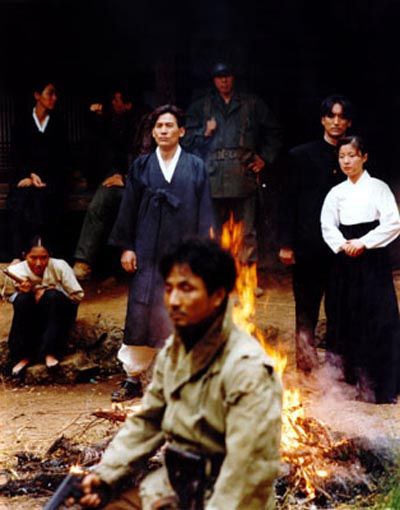
The two South Korean military commanders contrast each other well, the first being a zealot for finding and eliminating as many Communists and their sympathizers as possible, even with the slightest of ties while also using the moment to take care of personal agendas. He vanishes without explanation when his replacement, Shim Jae-mo (Choi Dong-joon) arrives, who represents a much more reasonable military commander. The contrast itself is interesting, showing the multitude of approaches even within the military, but without any narrative glue to explain what happened to cause the changeover much of the two characters’ potential is lost.
The lead protagonists are the Yeom brothers and teacher Kim. The Yeoms actually have a well developed relationship and effectively shows how even brothers found themselves at the wrong end of each other’s guns during the conflict while also exemplifying some of the worst traits of each side. Sang-jin’s worship of Communism results in bloodthirst but also a willingness to turn a blind eye to the injustices of the actual Northern army when they finally reach Beolgyo. Meanwhile, Sang-gu’s cop is prone to turning a blind eye of thuggish vigilantism, corruption, and even rape on his own part, even though he is less driven by ideology than he is by pragmatism and shows a little bit more of a human side.
In the middle is teacher Kim, who is effectively the mouthpiece for author Jo Jung-rae and Im Kwon-taek. The most compassionate, understanding and respected character in the film, he doesn’t really develop at all as a character, but seems to exist to rebut both Communist ideology as a solution for the Koreas as well as argue for populism against rightist elites. Unfortunately, this leads to a fairly flat character that spends a bit of time in the kind of bald didactic conversations that would make Socrates proud. These moments are also so blunt that they almost seem tacked onto the film as a lesson.
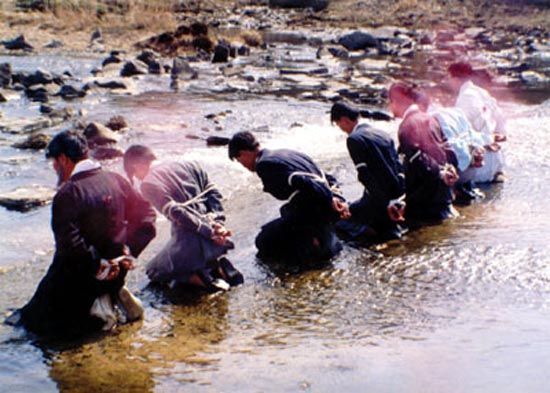
Despite these stumbles, The Taebaek Mountains still holds quite a bit of power, especially in displaying just how much damage the ideological war would place on the Korean people, from families separated and hatred engendered to villages destroyed and innocent people unjustly imprisoned or executed.
Towards the end of the film, the Communist rebels enter a rural farming village and claim recruits, followed shortly by South Korean forces, who then threaten them to reveal whether the Communists arrived. The townspeople eventually buckle and one tells exactly who helped the Communists, even if it was against their will, resulting in the execution of the recruits’ families. Then the Communists return, finding out that they told the South Korean army that they had indeed been there and proceed to execute the villagers that spoke to the South Korean army. Finally, the army returns yet again with an order to evacuate as they raze the village to keep the Communists from getting supplies and recruits from it.
And its these kind of moments in the film, including the better moments of the Yeom brothers saga as well as the smaller stories of townspeople who choose not to side with either group, but uphold a different ideology that help keep The Taebaek Mountains from drowning in its ambition.
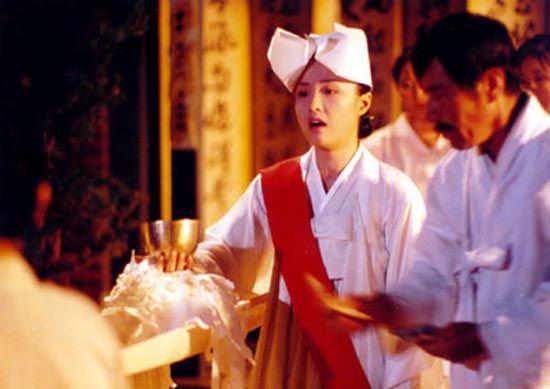
This is further helped by Im Kwon-taek’s direction, continuing with his more art-house-like style that he has been cultivating since the 1980s, with a strong emphasis on character and ritual observation. The film is also bolstered by strong production work, especially given that the film was made before Chungmuro’s technical renaissance in the early 2000s. Beolgyo itself becomes a character as it changes with each conquest as South and North Korean banners fly and the uniforms of the occupying forces change.
Performances are generally pretty strong too, even from the minor players, although the more zealous characters on both sides border on becoming wide-eyed and firebreathing caricatures. Unfortunately, because of the overreach of the script and many characters not getting the story attention they need, some of these performances feel a bit wasted. And that all comes down to trying to adapt too much from the novel to the film and lacking the finesse in story editing to tie all those ends together.
But even if the film is sometimes cumbersome in its need to hammer on its points about the dangers of radical and reactionary ideologies, often at the expense of character and story, it is still quite good at showing the devastation of the conflict on the Korean people through the representative setting of Beolgyo. The Taebaek Mountains is ambitious in scope and even though it stumbles, because it aims high, it still manages to be a decent portrayal of how the ideological war created a longstanding wound in the country’s psyche. It might be too long for a casual, but will certainly be interesting to those with interest in art films, Korean history, and the Cold War. 7/10.
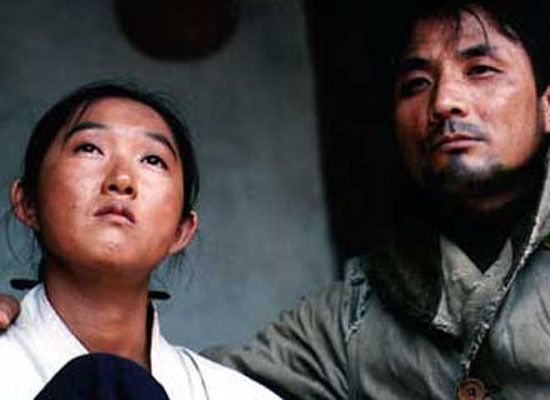
Tags: Ahn Sung-ki, featured, Kim Gab-soo, Shin Hyun-joon

![[Beanie Recs] Feel-good fantasy?](https://d263ao8qih4miy.cloudfront.net/wp-content/uploads/2022/05/BeanieRecs.jpg)


![[Beanie Review] A Virtuous Business](https://d263ao8qih4miy.cloudfront.net/wp-content/uploads/2024/10/AVirtuousBusiness_reviewb.jpg)





Required fields are marked *
Your email address will not be published. Required fields are marked *
1 Ivoire
July 6, 2013 at 4:37 AM
Thank you for the review!
Required fields are marked *
2 Selena
July 6, 2013 at 6:35 AM
It reminds me about what happened to a small town in my country after WW II in which people were accused of being communist and murdered without reasons as told by my father who witnessed the floating carcasses in the river crossing the city.
What I learn from this kind of movie is that people in authority most often abuse their power in the name of ideology or religion to stay in power by sacrificing innocence people.
Thanks for the review, r_d!
Required fields are marked *
3 Dan Strickland
July 6, 2013 at 7:28 AM
Excellent historical discussion. Minor point - it's Yeosu - 여수.
Required fields are marked *
refresh_daemon
July 7, 2013 at 1:12 AM
Thanks for catching that!
Required fields are marked *
4 dany
July 6, 2013 at 8:36 AM
Thank you.
Required fields are marked *
5 wwjaustendo
July 6, 2013 at 9:19 AM
Thanks for reviewing these films! I've been writing papers about Korean cinema and I find it really helpful to read these descriptions of important films that I'm not familiar with yet.
Required fields are marked *
6 snow_white
July 6, 2013 at 10:04 AM
thanks for the review.....Kim Gab Soo is looking so young!!
Required fields are marked *
7 Peggy
July 6, 2013 at 4:43 PM
This sounds very much the same as a drama that was made called 'Seoul 1945'. It was in the same time frame and showed the same inhumanity of man towards a weaker person. It was not easy to watch, even in a drama, how people were forced to leave their homes in order to at least save their lives. Many times they were force marched and then killed anyway once out of the city or town.
I guess this is the way it will always be and Korea sadly is still a country where the divisions are strong.
Required fields are marked *
8 bd
July 6, 2013 at 11:55 PM
One heck of a cast!
Required fields are marked *
9 alua
July 7, 2013 at 12:41 AM
You make me feel guilty about all the Im Kwon-take films I haven't watched, and didn't watch when they had the big retrospective here last year. x_x
Admittedly, I find it sometimes hard to watch older films (my inclination is always to choose contemporary ones), but then whenever I do I enjoy them thoroughly – The Blue in You and So as to Sleep as to Dream (Japanese that one) come to mind...
Required fields are marked *
10 Arnold
July 8, 2013 at 5:10 AM
Gotta say, I don't know anything about this film. Great review...i gotta see this now.
Required fields are marked *
11 Men Boong
July 8, 2013 at 6:56 AM
Sounds fascinating. Even just to get some insight into Korean history. I'm more inclined to watch the movie after having read the review, as I wouldn't have been able to understand the plot setting / background otherwise.
And minor point, but how cool is it that Im Kwon Taek is Kwon Hyun Sang's dad??!!
HE of the HOT HOT evil vampire prosecutor fame. Slurp...And more recently, still hot but not as cos I can't see your face behind those maggi dreads, Kkeokjeong.
Guess all that film industry juju just runs in this family.
Required fields are marked *